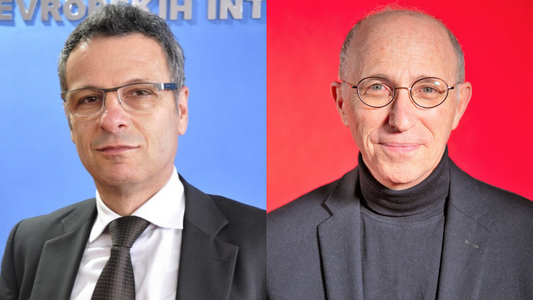The Monroe Doctrine at 200: Unraveling Two Centuries of American Diplomacy

On Saturday, December 9, 2023, Professors Vesko Garčević, Goldstein (emeritus), Mayers (Political Science Department) and Mark Storella presented analysis of “The Monroe Doctrine: 200 Years of American Diplomatic History.” Organized by Emmanuel College Professor Petros Vamvakas and the Emmanuel College Institute of Eastern Mediterranean Studies, the symposium also included Emmanual History Professor Javier Marion.
Professors Goldstein, Mayers an Marion sketched the historical context of this touchstone American foreign policy instrument. Goldstein and Mayers cited the roots of the Monroe doctrine in U.S. diplomacy with the United Kingdon, with Secretary of State John Quincy Adams the actual author. In asserting that the Western Hemisphere would be closed to further European colonization, when the United States had no power whatsoever to enforce the claim, the U.S. established a pattern in diplomacy that would be repeated over the next 200 years of expansive declaration statements as instruments of policy. Subsequent American leaders would elaborate the Monroe Doctrine through “corollaries” which went beyond Adams original conception and supported American hegemony in the western hemisphere. The doctrine took on an increasingly ideological sense that the Western Hemisphere would be governed differently from the monarchical and allegedly more corrupt nations of the Old World, with links to the development of even more universalist instruments such as Genocide Convention and the Universal Declaration of Human rights, both of which are 75 years old this month.
Professors Garčević and Storella then explored the implications of the Monroe Doctrine for American diplomacy up to the modern era. Storella noted the tradition the document established of active public diplomacy as a tool of American diplomacy, citing subsequent examples including Secretary of State John Hay’s Open door notes (a kind of Monroe Doctrine for China), Wilson’s 14 points, and the Atlantic Charter. Garčević and Storella discussed how the Monroe Doctrine has grown into a pillar of American exceptionalism, with attendant consequences in critiques of American hubris and even hegemony. Under the Monroe Doctrine, the U.S. led a proliferation of multilateral diplomacy in the region which often prefigured multilateral diplomacy on the world stage. Noting the application of the Monroe Doctrine in both the Cuban Missile Crisis and the Reagan Administration’s Cold War policies, they also outlined the limits of the Doctrine’s application as countries in the hemisphere emerge as middle powers themselves with links to external groupings like the BRICS.
Nevertheless, at 200 years of age, the Monroe Doctrine remains an influential element in America’s approach not only the Western Hemisphere but also to the wider world.
Ambassador Vesko Garčević dealt with issues pertinent to European security and NATO for almost 14 years during his diplomatic career. In 2004, he was posted in Vienna to serve as Ambassador to Organization for Security and Cooperation in Europe. He was Montenegro’s Ambassador to NATO from 2010 until 2014 and served as Montenegro’s National Coordinator for NATO from 2015 until he joined the faculty at the Pardee School. Learn more about Ambassador Garčević on his faculty profile.
Ambassador Mark C. Storella was a United States Foreign Service Officer for over three decades serving as Ambassador to Zambia, Deputy Assistant Secretary of State for Population, Refugees, and Migration, and Dean of the Leadership and Management School of the Foreign Service Institute. Storella is a recipient of the Presidential Rank Award, the Centers for Disease Control and Prevention’s Excellence in Service Award, the Thomas Jefferson Award presented by American Citizens Abroad, and several Department of State superior and meritorious honor awards. Learn more about Ambassador Storella on his faculty profile.